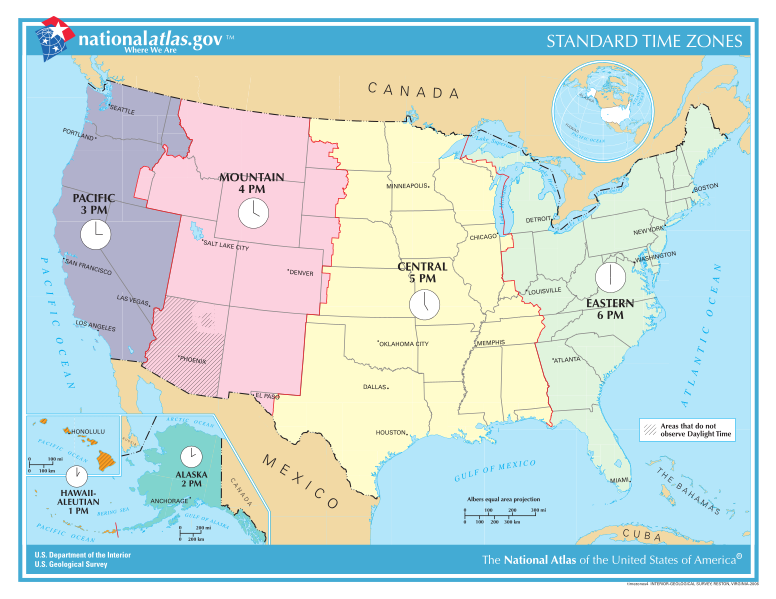Should Massachusetts Secede from Eastern Standard Time?

Image via Wikimedia Commons
The backlash against Daylight Savings Time is coming early this year.
Each fall, people groan about setting their clocks back and losing an hour of evening light in the already dark winter months. Once a year, we trot out the same case against Daylight Savings Time. It disrupts our sleep. It decreases economic efficiency. It causes an uptick in heart attacks. Plus, it just plain sucks to see the sun set before 5 p.m. America, we say, should collectively abandon Daylight Savings Time.
Now, nearly a full month before we fall back, Tom Emswiler is proposing a more local solution. Writing for the Globe, Emswiler argues that Massachusetts should secede from Eastern Standard Time and take our business one time zone east to Atlantic Standard Time:
Used in eastern Canada, the Caribbean, and much of South America, it matches the time we already use in the summer, and would simply mean that in the fall, we don’t have to fall back.
Emswiler’s proposal actually isn’t that disruptive to the way we currently do business, he argues.
As it is, we’re actually only on Eastern Standard Time for about four months per year, from early November until early March. In the spring, summer, and early fall we’re on Eastern Daylight Time, which is the same as AST.
It’s an enticing idea, the prospect of seeing daylight last longer than it does in Alaska through the winter. It caught some steam this weekend on Twitter and attracted notice in publications like CityLab. But in some sense, it’s a solution that trades one inefficiency for another. We already confuse ourselves by switching time zones twice a year. Unless this idea really took the nation by storm, Massachusetts would exist on a different time zone from the rest of the East Coast (though Enswiler envisions the rest of New England following suit, eventually.) We’d be switching time zones any time we hopped an Amtrak to New York City.
That’s a pain because our schedule for the day is determined by a lot of factors other than the time on our phone screens. Some research suggests that we design our schedules around TV programming rather than daylight. Who cares what hour it is in Massachusetts. Kickoff for Monday Night Football is still happening at 8:30 EST. (That’s 9:30 AST.) If you do business with New York City or Washington D.C., you’re going to end up getting to the office around when your business contacts do. So your 9 a.m. phone call with your client in is happening at 8 a.m. in New Jersey. You’ll just have the added confusion of coordinating meeting times across a time zone.
The confusion of working and communicating across time zones is why Quartz’s Allison Schrager proposed a nearly opposite solution last year that accounted for the idea that we’re mostly living our lives in coordination across America, anyway. The United States, Schrager wrote, should just exist on two time zones that never change. It’d be a reflection of the reality she found moving between Austin and New York:
“I found that in Austin, everyone did things at the same times they do them in New York, despite the difference in time zone. People got to work at 8am instead of 9am, restaurants were packed at 6pm instead of 7pm, and even the TV schedule was an hour earlier.”
This, of course, isn’t a great solution for New England in terms of maximizing daylight in the evening hours. The larger point though, is that society is in an even more interconnected place than we were when the United State decided to simplify to four time zones. Complicating it with the insertion of a state-by-state plan moves against that trend toward standardization.
We’d love to see Massachusetts keep that extra hour of evening light. But if we do someday refuse to fall back, let’s get the rest of the East Coast (and maybe the Central Time Zone) to do it with us first.


